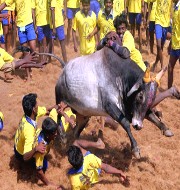Supreme Court refuses to lift ban on Jallikattu
The Supreme Court has dismissed a plea filed by Tamil Nadu to review a 2014 apex court judgment banning Jallikattu.
The apex court questioned the need to “tame” a domestic animal like the bull and further held that Jallikattu has nothing to do with exercise of the fundamental right of religious freedom.
It also held that Jallikattu runs counter to the concept of welfare of the animal, which is the basic foundation of the Prevention of Cruelty to Animals Act, 1960.
Tamil Nadu Government’s argument
However, the State government countered that Jallikattu was defined as an act of “taming” of bulls under the Tamil Nadu Regulation of Jallikattu Act, 2009 and it does not amount to cruelty. This law was introduced to stop any kind of torture and taming a bull is not torture.
What is issue?
The Supreme Court had banned Jallikattu in May 2014 and held that bulls could not be used as performing animals. It ordered to completely stop use of bulls for Jallikattu events or bullock-cart races across the country. The ban was imposed by SC as it violated provisions of The Prevention of Cruelty to Animals Act, 1960; fundamental duty Article 51A (g): compassion towards animal; Article 21 (Right to Life), which prohibits any disturbance to the environment, including animals as it is considered essential for human life. However, in January 2016, the Union Government through notification lifted this ban and allowed use of bulls for Jallikattu events or bullock-cart races in Tamil Nadu and Maharashtra. But, the apex court put on hold of the Union Government’s notification.
What is Jallikattu?
Jallikattu is a bull taming sport played in Tamil Nadu on Mattu Pongal day as a part of Pongal celebrations i.e. harvest festival. It is one of the oldest living ancient tradition practiced in the modern era. Jallikattu has been derived from the words ‘calli’ (coins) and ‘kattu’ (tie), which means a bundle of coins is tied to the bull’s horns. In Sangam literature the sport is called as ‘Yeru thazhuvuthal’ (means to embrace bulls). In older times Jallikattu was popular amongst warriors during the Tamil classical period. The bull tamer sought to remove this bundle from the animal’s head to win gold or silver coins to be called ‘brave’ and ‘valourous’. All castes participate in the event and majority of jallikattu bulls belong to the pulikulam breed of cattle.
Month: Current Affairs - November, 2016
4 Comments
Leave a Reply
You must be logged in to post a comment.



vignesh
December 17, 2016 at 5:48 pmCourt is not willing to Stop Horse race it also violates Article 51A (g) of compassion towards Animals, since it is involved with Corporate rich while Bullcart race is followed by poor village people.
vignesh
December 17, 2016 at 5:48 pmCourt is not willing to Stop Horse race it also violates Article 51A (g) of compassion towards Animals, since it is involved with Corporate rich while Bullcart race is followed by poor village people.
shreyashkar
January 21, 2017 at 12:09 pmsc has nothing to do with rich and poor . in jallikattu some cruel methods are applied on the bulls to make them more ferocious which is against the nature of law while in horse races there is no such thing . on the other hand horses are biologically equipped for racing.
shreyashkar
January 21, 2017 at 12:09 pmsc has nothing to do with rich and poor . in jallikattu some cruel methods are applied on the bulls to make them more ferocious which is against the nature of law while in horse races there is no such thing . on the other hand horses are biologically equipped for racing.